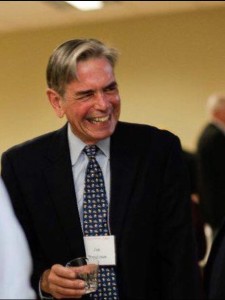When Jonathan Senchyne asked me earlier today to write a post for the Center’s blog remembering Jim Baughman, I agreed without thinking about the enormity of the task at hand. Accepting the news that Jim has died is one thing, but saying goodbye to a beloved teacher and friend is quite another. The UW-Madison J-School offered a wonderful memorial for him earlier here. Jim’s work touched many outside of his home department, particularly through his affiliation with the Center for the History of Print and Digital Culture, whose students – like me – he welcomed warmly into his courses.
Jim was a brilliant teacher who knew how to create space for failure while pushing his students to strive for excellence. He valued precision and integrity in his student’s writing and was constantly searching for ways to inspire them and to help them improve. Above all, Jim displayed an enthusiasm for his work that was remarkable. He was always looking for how to be better, how to think better, how to teach better. He often asked for feedback from our seminar on his teaching, a strategy that allowed us to think about how we might teach better, and how we might improve as colleagues and thinkers. Jim was a rare person.

I gave birth to my son during the semester that I took Jim’s History of Mass Communication graduate seminar, an event he welcomed with delight. He asserted often that the journalism school is a “family forward” space and never once questioned my decision to continue my studies through that challenging time. He was welcoming the morning I needed to bring my infant son to class because there was no one to watch him, joking that he was glad to add a seventh member of our small seminar group. His seminar provided an island on which I could still hold onto who I was before I became a parent, during a time in my life that everything changed profoundly.
A lover of print, there are reminders of Jim throughout my home. In addition to the dozen books I read for his course and the handful more than he recommended to me, there’s the large green printed course packet from Bob’s Copy Shop that he still used for his courses, because, as he once said, his feet were “firmly planted, if not cemented, in the 20th century”. Though I often grimaced as I dragged the several hundred page doorstop around Madison, I am grateful to have the collection of articles he deemed worthy of our time with my marginalia from the conversations my fellow students and I shared with him.
Jim shares his death date with Walt Whitman, who offers this comfort:
end to arrest it,
All goes onward and outward, nothing collapses,
And to die is different from what any one supposed, and luckier.
We never really say goodbye to our best teachers, it is impossible, their imprint on our lives never really fades or disappears. Jim, I wish I could say thank you one more time, so I will say it here: Thank you for challenging and inspiring me, and so many of my fellow students, to be better thinkers and a better people. Thank you for inspiring us on the days we felt like we had nothing to offer, and for celebrating us during our moments of triumph and clarity. Thank you for creating space for me to be your colleague and friend, even as a graduate student just starting out. Thank you for the laughs, for the sports chit-chat in the hallway, for the big glass of bourbon at the holiday party you threw for us in your home. We miss you, we always will, and we are all better for having known you.
Lauren Gottlieb-Miller
UW-Madison SLIS MA, 2014
Houston, Texas